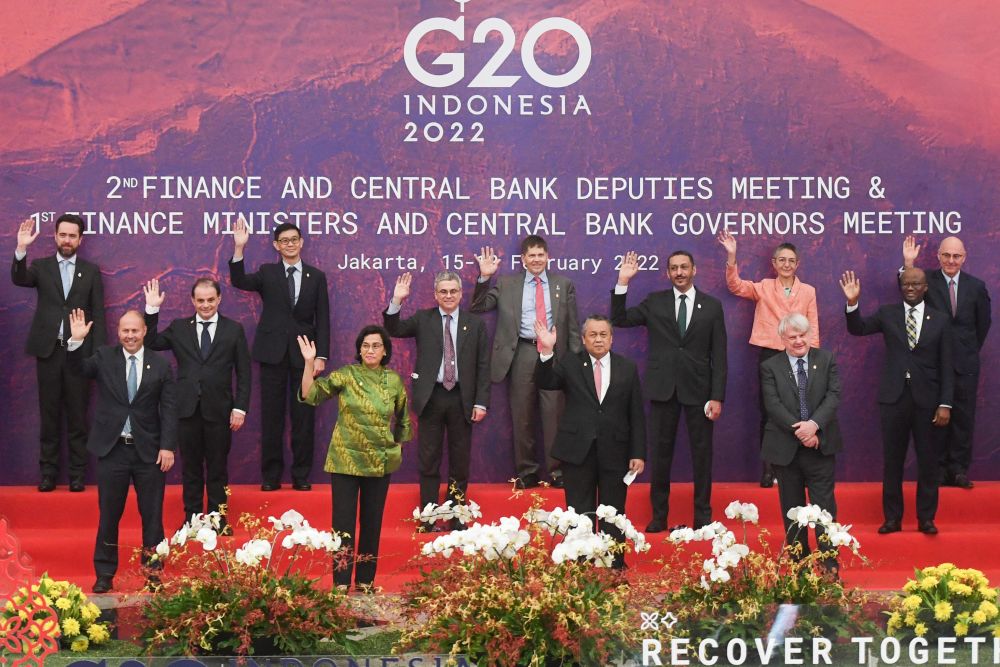JAKARTA, Feb 18 — Finance leaders from the Group of 20 major economies view inflation and geopolitical risks as threats to a global recovery from the Covid-19 pandemic that already is “asynchronous” due to uneven access to vaccines, a draft communique obtained by Reuters showed on Thursday.
The G20 finance ministers and central bank governors, meeting both virtually and in Jakarta, pledged in the draft to use “all available policy tools to address the impacts of the pandemic,” but warned that future policy space was likely to be “narrower and uneven.”
“We will continue to strengthen the resilience of global supply chains. We remain vigilant of the impacts of these challenges on our economies,” the G20 finance ministers and central bank governors said in the draft statement, which will be finalised on Friday, when their meeting concludes.
“We will also continue to monitor major global risks, including those arising from (current) geopolitical tensions and macroeconomic and financial vulnerabilities,” the ministers said.
The statement contained no direct reference to the crisis on the Ukraine-Russia border, and the word “current” in brackets indicates that it may be deleted. Russia is a member of the G20.
Fears that Russia might invade Ukraine overshadowed the start of a meeting that was expected to focus heavily on growing risks from inflation and monetary tightening to control it. Indonesian President Joko Widodo issued a direct warning that tensions over Ukraine could disrupt the recovery, adding “now is not the time for rivalry.” Moscow has denied it is planning an invasion of its neighbor.
The finance leaders said in the draft communique that inflation is currently elevated in many countries, prompted in part by “supply disruptions, supply demand mismatches and increased commodity prices, including energy prices.”
“Central banks will act where necessary to ensure price stability in line with their respective mandates, while remaining committed to clear communication of their policy stances,” the ministers and governors said, adding that central bank independence was crucial for credibility.
They confirmed a commitment to “well-calibrated, well-planned and well-communicated exit strategies to support recovery, with due consideration for individual country circumstances.”
Pandemic fund, tax deadline
The G20 finance leaders voiced support for ensuring timely and affordable access to Covid-19 vaccines, therapeutics, diagnostics and other medical supplies for low- and middle-income countries, according to the draft.
They asked the G20 Joint Finance-Health Task Force to report by April on options to establish a fund for pandemic preparedness, for further work in July and in October with G20 health ministers.
US Treasury Secretary Janet Yellen earlier on Thursday urged her G20 counterparts to back the proposed fund, with needed health system investments estimated at US$75 billion (RM314 billion).
The G20 finance leaders affirmed their commitment to developing the rules and other instruments to implement a global tax agreement reached last year to put the new rules into effect in 2023.
They also pledged to “do more to secure (the) long-term success” of a G20 common debt restructuring framework for poor countries, although that language also was in brackets, making it subject to change.
On climate change, the G20 ministers said reaching carbon emissions “net zero” goals should include a full range of tools, including “if appropriate, the use of carbon pricing mechanisms and incentives and phase out and rationalise, over the medium term, inefficient fossil fuel subsidies that encourage wasteful consumption.”
The G20 finance leaders also said they would continue to study central bank digital currencies to better understand their financial system implications “including for spillovers and capital flows.”
They also called for considering G20 principles for high quality infrastructure investment, by July 2021, but the language on the timing also was contained in brackets, meaning it may change.
The work is being conducted by the International Finance Corporation, a division of the World Bank, whose President, David Malpass, has been critical of China’s Belt and Road infrastructure lending. — Reuters






















